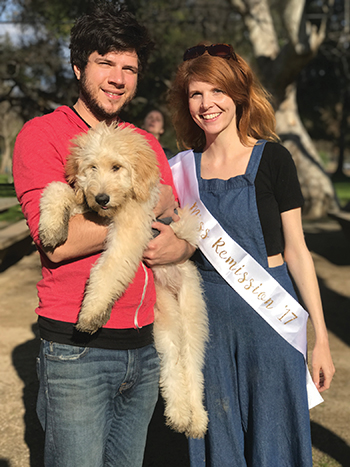Advanced Breast Cancer Survivor

Stage IV survivor uses social media to spread real awareness and hope
Timing has been everything for Annie Bond. It took longer than it should to get a Stage IV breast cancer diagnosis. Then, it took time to find the right oncologist, treatment plan and resources. Once she went into remission – an uncommon term with advanced breast cancer but one her doctor encourages her to use – it took time to be comfortable talking about it. But now she does in a big way, sharing messages of hope to other people facing cancer.
Self-breast exams weren’t on my radar. I was 25 with no family history of breast cancer. Even so, when my boyfriend found a lump in my left breast, I wasted no time getting it checked out. Twice I was told not to worry because I had dense breasts and was “too young” to have breast cancer. Nine months later, the doctor at my annual gynecology appointment finally paid attention. By then, the lump had grown and spread into my lymph nodes and liver. I had Stage IV ER+, PR+, HER2- breast cancer.
I met with an oncologist who gave me a grim prognosis of 2 to 5 years. He wanted to start treatment right away and listed the options I was to choose from: chemo, surgery, radiation, medications with complicated sounding names and terrifying side effects. I thought, “How could I or anyone in my family possibly be qualified to make important decisions about cancer? We aren’t doctors.”
I needed more information. What were my fertility preservation options? (This doctor had strong feelings about me not doing it.)Were there any financial resources that could help? (The medical office said they had a program but wouldn’t give me the information.) Would my insurance cover treatment? (I had just turned 26 so I was dropped from my parents’ policy, and this oncologist was out of network on my new policy.)
Although I quickly identified that this oncologist was not a good match for me, I credit him with helping me realize I needed to advocate for myself. Once I sought out more opinions on my treatment, I discovered how skilled and compassionate other cancer centers could be. This inspired me to educate myself and, eventually, others.
Before I even saw my current oncologist, I was set up with a social worker, mental health resources and program assistance. I froze my eggs (which insurance refused to cover) and filled out my first Advance Directive (a very strange experience for a 26-year-old).
We discovered that my cancer is considered Luminal B, which is slow-growing and unusual for someone my age. But this meant I had more treatment options and a better chance of survival.
My boyfriend and my mom were wonderful caregivers through my two years of active treatment, which included hormone therapy, a lumpectomy, removal of 18 lymph nodes, radiation therapy, a liver resection, an oophorectomy and countless tests and scans. I eventually started a new targeted therapy that had just been approved, and I’m still on it today.
During treatment, I adopted two cats and a dog for emotional support. This led me to start a dog walking/pet care business. My career as a stand-up comedian had gone south when late night audiences didn’t find my cancer jokes as funny as I did. Some people say laughter is the best medicine. I say medicine is the best medicine, but finding humor and joy in my cancer journey really helps.
I went to group therapy and learned about the power of community and telling my story. Everyone else was saying out loud all the words that were in my brain. We were all young with different cancer diagnoses, but mentally we were playing the same game and dealing with the same struggles. It was so powerful. Once my doctor told me I was considered in remission, I knew I wanted to make a difference.
I started by posting silly videos on TikTok (@AnnieBond). My followers grew and I shared more. I quickly saw solidarity on a much larger scale among people of all ages. It is still so healing for me to get my thoughts out there. My goal is to spread real awareness about the struggles facing survivors and the need for more funding for advanced breast cancer. Just because it’s Stage IV doesn’t mean it’s hopeless. We deserve more.


